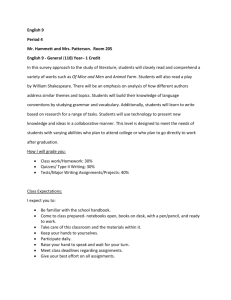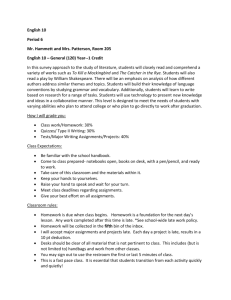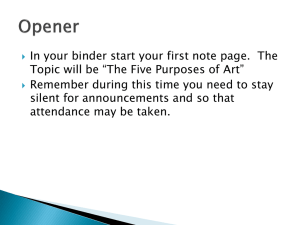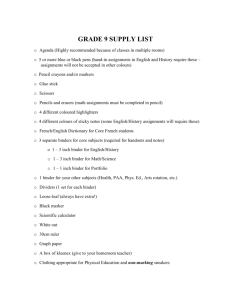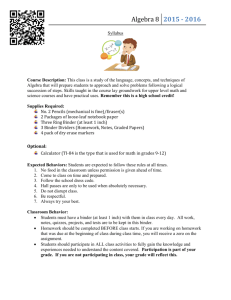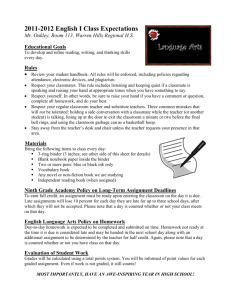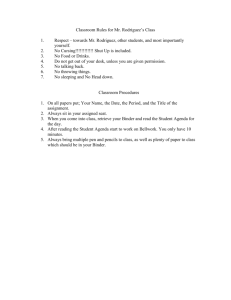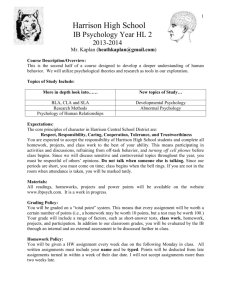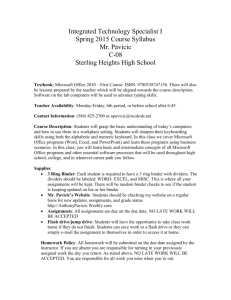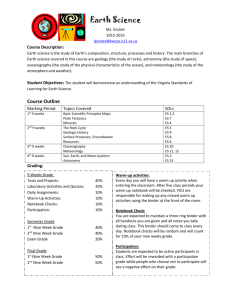Classroom Policies - Warren Hills Regional School District
advertisement
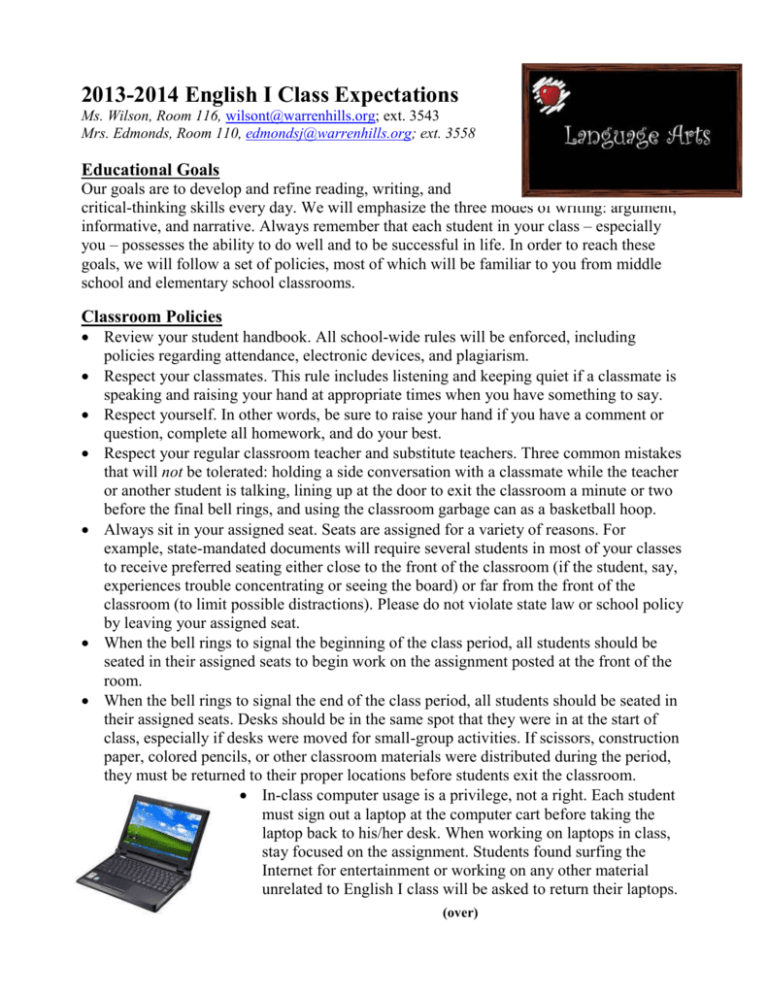
2013-2014 English I Class Expectations Ms. Wilson, Room 116, wilsont@warrenhills.org; ext. 3543 Mrs. Edmonds, Room 110, edmondsj@warrenhills.org; ext. 3558 Educational Goals Our goals are to develop and refine reading, writing, and critical-thinking skills every day. We will emphasize the three modes of writing: argument, informative, and narrative. Always remember that each student in your class – especially you – possesses the ability to do well and to be successful in life. In order to reach these goals, we will follow a set of policies, most of which will be familiar to you from middle school and elementary school classrooms. Classroom Policies Review your student handbook. All school-wide rules will be enforced, including policies regarding attendance, electronic devices, and plagiarism. Respect your classmates. This rule includes listening and keeping quiet if a classmate is speaking and raising your hand at appropriate times when you have something to say. Respect yourself. In other words, be sure to raise your hand if you have a comment or question, complete all homework, and do your best. Respect your regular classroom teacher and substitute teachers. Three common mistakes that will not be tolerated: holding a side conversation with a classmate while the teacher or another student is talking, lining up at the door to exit the classroom a minute or two before the final bell rings, and using the classroom garbage can as a basketball hoop. Always sit in your assigned seat. Seats are assigned for a variety of reasons. For example, state-mandated documents will require several students in most of your classes to receive preferred seating either close to the front of the classroom (if the student, say, experiences trouble concentrating or seeing the board) or far from the front of the classroom (to limit possible distractions). Please do not violate state law or school policy by leaving your assigned seat. When the bell rings to signal the beginning of the class period, all students should be seated in their assigned seats to begin work on the assignment posted at the front of the room. When the bell rings to signal the end of the class period, all students should be seated in their assigned seats. Desks should be in the same spot that they were in at the start of class, especially if desks were moved for small-group activities. If scissors, construction paper, colored pencils, or other classroom materials were distributed during the period, they must be returned to their proper locations before students exit the classroom. In-class computer usage is a privilege, not a right. Each student must sign out a laptop at the computer cart before taking the laptop back to his/her desk. When working on laptops in class, stay focused on the assignment. Students found surfing the Internet for entertainment or working on any other material unrelated to English I class will be asked to return their laptops. (over) Page 2 – Class Expectations Stay away from the teacher’s desk and chair unless the teacher requests your presence there. Homework assignments should be written on a computer and then printed out, unless your teacher announces that she will accept handwritten work for a particular assignment. (If you do not have a computer available at home, please let Ms. Manfra know.) At the top left corner on the first page of each writing assignment, you must use a four-line, double-spaced, Modern Language Association (MLA) heading. This is what the MLA heading looks like: Your first and last name Jonathon Swift Teacher’s name Ms. Manfra EXAMPLE: Your class subject, block number English I, Block 3/C Date (number of the day, month, year) 7 July 2013 Classroom Signal Many of our literature units will offer a great deal of time for students to work together in pairs or in small groups. During such activities – and in other situations, too – your teacher will occasionally need to get all students’ complete attention to give further directions, to clear up directions that some students cannot understand, etc. When you hear Ms. Manfra announce, “Give me your attention, please,” all classroom discussion and activity must stop until Ms. Manfra has finished making the point that she wants to make. These five words are called a “classroom signal.” Please listen for it during classroom activities. Materials Bring the following items to class every day: 3-ring binder (2 to 3 inches; see separate handout for details) Unused, lined notebook paper inside the binder Two or more pens: blue or black ink Vocabulary book or any novel or non-fiction book we are studying Textbook Highlighters Sticky notes Flash drive Ninth Grade Academy Policy on Assignment Deadlines To earn full credit for an assignment, you must be prepared to hand it in upon entering the classroom on the day it is due. Late assignments will lose 10 percent of their total points for each day they are late for up to three school days, after which they will not be accepted. Deadlines are extremely important in college and in the workforce; now is the time to get used to them. Evaluation of Student Work Grades are calculated on a total-points system. You will be told the point value for each graded assignment. Our goal is to surpass 700 points per marking period but to avoid going over 1,000 points. Even if work is not graded, it still counts! The Three-Ring Binder: Your Lifeline to Success You are required to keep class notes, teacher handouts, completed assignments, lined paper for free-writes and formal writing assignments, and other material in a threering binder. The width of the binder should be 2 inches or thicker. Keeping an up-todate and organized binder will help you prepare for quizzes and tests, including the final exam at the end of the school year. In addition, each marking period will include at least one “notebook spot check” in which you can earn points by showing the teacher that your binder is organized and contains all of the necessary information. Therefore, always do your best to keep your notebook up-to-date and well-organized! Divide your binder into the following five sections: General Notes, Free Writing, Literary Terms, Vocabulary Terms, and Assessment Portfolio: The General Notes section is reserved for in-class note-taking and for handouts that you receive from your teacher. You will get to practice your writing ability in the Free Writing section. Literary Terms should contain your notes about literature- and writing-related terms that we will cover in class (e.g., alliteration, epiphany, irony, and foreshadowing). Handouts and homework related to vocabulary assignments and quizzes should remain in the Vocabulary Terms section. The Standards/Lesson Log section will contain Standard Packets and all Lesson Logs. If any Standards Packets are misplaced, please reprint from class website. A three-hole punch will be available in the classroom for students to use whenever they wish to add non-hole-punched pages to their binders. These organizational practices will make it easier for you to locate information. Bottom line: Always keep your notes, standards packets, lesson logs, handouts, and free-writes.
